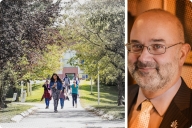You have /5 articles left.
Sign up for a free account or log in.
It's that time of year. I've read through more resumes and essays than I care to remember. I have the luxury of reviewing applications written by the most accomplished young men and women at my university as they dream of life after the molly-coddling experience we in the US call 'college.'
Fellowships seek young scholars of depth and breadth. The two categories can appear contradictory. The be-goggled geek may never engage the world beyond her beaker despite a deep understanding of the bubbling chemicals in her grasp. The triple-major, student-government-president may skim a broad surface but fail to understand much of anything. Whither the ‘middle path?’
No one wants to wind up a dilettante. The person who engages in a vast array of activities may fail to see their core connection at first. That disorder defines dilettantism: activity, even excellence at an activity, for its own sake. Look at me! I’m fantastic! I can juggle, play the bassoon, recite the Aeneid in the Latin, prove Fermat’s last theorem, and dance the tarantella. But why? And to what end?
When the dilettante discerns the connective tissue among the activities and identifies the driving force that motivates them all, s/he ceases to carry the label and graduates to the mature status of “Renaissance” wo/man. Leonardo DaVinci could demonstrate why and how his science improved his art as well as the reverse. Thus, he remains the icon of the Renaissance man not the early modern dilettante.
The subtlety of the distinction confounds most. Universities advertise their students’ ability to pursue three majors, play a varsity sport, and spend breaks in different ‘developing’ countries. Indeed, they can, but they take little from it. Minimum coursework for three majors typically teaches less than one studied in depth with clusters of correlated electives. Two weeks spent with local children in a clinic does not equate to twelve months living among them and learning their language. Our students spin about subjects and landscapes like whirling dervishes, who have forgotten that they must mature and stop to be of service.
Parents panic-stricken for their progeny feed the frenzy. Their practical reasons why their children should acquire skill sets rarely translate to meanings able to motivate students’ essential selves. They underscore the how - to get into grad school; to land the job; to make lots of money - without an explanation as to why the child cum adult should desire that goal.
The lucky ones figure it out for themselves before they wake up as management consultants with large bank balances and shriveled souls. Those of us on the advisorial front lines attempt to hold up mirrors and find the DaVincis within the dilettantes. The application process offers an unrivaled opportunity for such introspection and necessitates a stockpile of tissues.
September is my month of tears. In shock that they have no idea why they do what they do beyond parental injunctions to do it, superstars seep. The facade fractures; lips quiver; and eyes fill. Sometimes recovery necessitates amputation of imposed ideas. Parents’ penury need not demand their offspring’s focus on finance. Mom’s stellar medical career will shine whether or not her daughter becomes an MD. Dad’s company can endure without his son at the helm.
The final lab class for a third major in biology becomes a seminar about Baudelaire and a future in international law. The hours in an accounting internship get re-allotted to the solar car team and lead to a green revolution. That bit of biology helps to prosecute a weapons case in Brussels. Some economics serves the engineer well when she solicits start-up funds. Each now understands the why that motivates the how. They have redefined the dilettante with a personal renaissance and merit Mona Lisa’s smile.
Elizabeth Lewis Pardoe is a member of the University of Venus editorial collective and an associate director of the Office of Fellowships at her undergraduate alma mater, Northwestern University. She earned M.Litt. and M.Phil. degrees in European History as a Marshall Scholar at Cambridge University before completing her doctorate in American History at Princeton University. For more, follow ejlp on Twitter or go to http://elizabethlewispardoe.wordpress.com.








